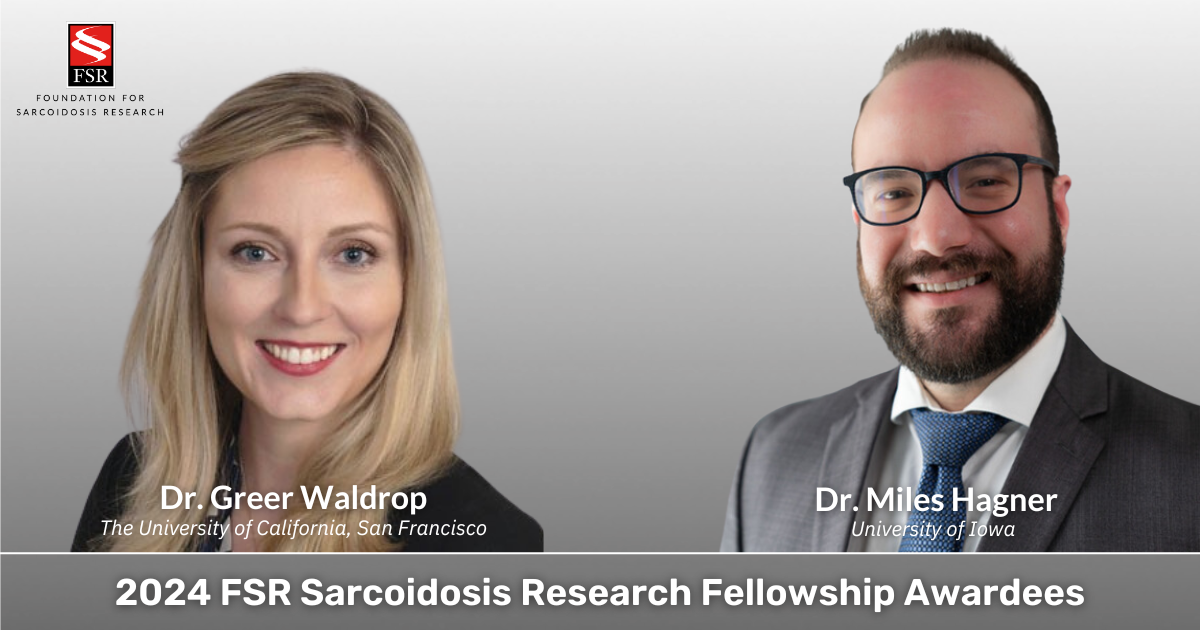
CHICAGO, July 24, 2024 (GLOBE NEWSWIRE) -- The Foundation for Sarcoidosis Research (FSR) is pleased to announce that Dr. Greer Waldrop, University of California, San Francisco, and Dr. Miles Hagner, University of Iowa, have been selected as the recipients of the prestigious FSR Sarcoidosis Research Fellowship Grant. This fellowship is designed to support early-career investigators as they develop specialized skills and gain valuable experience in sarcoidosis.
Thanks to the support of a very generous donor and the high quality of this year’s applications, FSR is pleased to extend funding to two extraordinary research projects. Dr. Waldrop and Dr. Hagner will each receive $150,000 towards each of their research projects, aimed at advancing the understanding of sarcoidosis and improving patient outcomes. Since 2018, FSR has awarded over $2 million in support of Sarcoidosis Research Fellowship Grants, demonstrating a substantial investment in the future of sarcoidosis research and reflecting FSR’s commitment to fostering innovation and excellence in this critical field.
Dr. Waldrop’s research aims to study RNA to help identify potential causes and strategies for generating therapies targeted to individuals in advancing the opportunity and effectiveness of treatment of neurosarcoidosis. “I am thrilled for the generous support from the Foundation for Sarcoidosis Research and eager to focus attention on improving clinical and molecular understanding of neurosarcoidosis,” said Dr. Waldrop. “I am particularly excited about the opportunity to standardize and validate definitions of disease activity within neurosarcoidosis and the possibilities for more informed pathophysiology (understanding of the disease progress) and targeted therapeutics from my cerebrospinal fluid transcriptomic analyses.”
Dr. Hagner will be exploring the role of airway epithelial responses (respiratory cells critical in immunological defense) in creating the immunological responses which lead to sarcoidosis. The goal of this research would be to try to identify in these cells a biomarker that can expediate diagnosis and/or help streamline the identification of impactful therapeutics. “Having my research project recognized by the Foundation for Sarcoidosis Research feels incredible. I found my ‘WHY’ when I started caring for and researching people with sarcoidosis,” said Dr. Hagner. “Receiving the FSR Fellowship Grant to pursue my research project means so much to me! My team and I are so appreciative of the support and can’t wait to continue this exciting research.”
“FSR is thrilled to be able to support this innovative research by Dr. Hagner and Dr. Waldrop,” said Mary McGowan, Chief Executive Officer of FSR. “We are eager to gain the insights from this research as we aim to focus on our shared goal to improve the treatments and outcomes for all impacted by sarcoidosis.”
The Sarcoidosis Research Fellowship is part of FSR’s broader mission to accelerate research, enhance patient care, and ultimately find a cure for sarcoidosis. By investing in emerging researchers, FSR aims to drive progress in the field and bring hope to the millions affected by this challenging disease.
For more information about FSR and its research initiatives, please visit stopsarcoidosis.org/.
About the Foundation for Sarcoidosis Research
FSR is the leading international organization dedicated to finding a cure for sarcoidosis and improving care for sarcoidosis patients through research, education, and support. Since its establishment in 2000, FSR has fostered over $6.5 million in sarcoidosis-specific research efforts. Learn more at stopsarcoidosis.org.
About Sarcoidosis
Sarcoidosis is a rare inflammatory disease characterized by the formation of granulomas—tiny clumps of inflammatory cells—in one or more organs of the body. Despite increasing advances in research, sarcoidosis remains difficult to diagnose with limited treatment options and no known cure.
Media Contact:
Cathi Davis
cathi@stopsarcoidosi.org
312-341-5000
A photo accompanying this announcement is available at: https://www.globenewswire.com/NewsRoom/AttachmentNg/a298ed38-e5c6-483b-8ff5-9f8243a2c1b5
